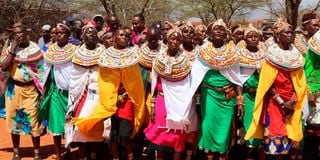We no longer make beads for Morans to ‘book’ girls for marriage

Samburu women adorned with beaded necklaces dance when they handed over Sh1.6 million to Northern Rangelands Trust officials at Kalama Conservancy on January 20, 2023.
What you need to know:
- Traditionally, Samburu women beaded necklaces used by morans to ‘book’ school going girls for marriage.
- They had never imagined their craft would come to the financial rescue of a family.
- Today, the 1,200 women make necklaces and sell them under the Northern Rangeland Trust Trading, earning a livelihood for their families.
For decades, Samburu women beaded necklaces used by morans to ‘book’ school going girls for marriage, thus contributing to an age-old culture of subjecting the learners to sexual exploitation and shuttering their education dreams.
They had never imagined their craft would come to the financial rescue of a family. This is, however, what happened when the drought that is still ravaging most parts of Northern Kenya, wiped out livestock.
When I meet Napunyo Lekirai from Sera Conservancy in Samburu County, she is distraught. Her family lost more than 50 goats and 10 cows worth over Sh650,000 during the drought last year, dealing a blow on her family, she tells me.
“It was devastating…we had no money yet we have children to take to school, and other needs including putting food on the table. The necklaces came to the rescue,” says Ms Lekirai, the breadwinner of her family since her husband is of advanced age.
International markets
“A few years ago, we had problems with our husbands who would stop us from attending group meetings and engaging in beadwork. Today, they have no problem because they appreciate our role in taking care of families,” she says.
The women make necklaces and sell them under the Northern Rangeland Trust Trading (NRT), earning a livelihood for their families. NRT Trading provides about 1,200 women with raw materials. The women use the beads and create products for local and international markets.
According to Ntito Lakaria, the project has given them dignity in the community, as they earn their livelihood.
“After it is sold, we get our money on our mobile phones and nobody knows how much we earn. It’s confidential and we are happy. In the past, we were just people of manyatta, but today, we have respect in the community. There is peace and no fight for resources, which is very important to us,” says Ms Lakaria.
“We would make the beads but never knew we were sitting on gold. After training on beading, we make good money and sometimes when the market is good, I can earn up to Sh5,000 per week,” she says, noting that they have abandoned the tradition of making beads for Morans to ‘book’ girls for marriage.
“A girl would be brought to us and we would make the beads in preparation for marriage but that is a thing of the past. Today, each woman knows that her girl has to go to school,” she says.
Apart from their upkeep and setting up businesses, the women also contribute some money to community initiatives.
Women groups in three conservancies – Kalama, Sera and Westgate – recently presented Sh1.6 million to NRT as their contribution to conservation efforts in a ceremony witnessed by the local political leadership led by Samburu county CEC in charge of Tourism, Trade and Cooperatives Raphael Lenaiyarra.
Gift shops
Karin Sebeka, the beadworks production manager, said the women donate five per cent of their earnings, adding that they train them so that they can make necklaces for various markets globally.
Ms Sebeka said since beading is a hobby among the Maa communities, the project added value to the skill by offering training with the ‘star beaders’ going to the manyattas to train other women. This has worked since they compete on who does best and earns more money, she says.
The women make products that are sold in the international markets and available in gift shops in the US, Australia and Europe according to Ms Sebeka.
“Unlike in the past when they were bullied, they are now proud of their families, and their husbands respect them. We also train them on leadership and they are able to manage their families better since they are also saving in a Sacco,” she said.
Through the trainings, the women have learned how to diversify and set up small businesses which they supplement their incomes.
Beatrice Lempaira, the project director said they work with women in eight conservancies in Laikipia, Samburu and Marsabit counties, noting that there are several others willing to join the initiative.
“We are currently working with 1,200 women yet there are over 20,000 out there who would wish to join us. Beadwork is done during free time and does not disrupt their lives, and we are looking for ways of expanding the market so that we can accommodate more,” she said.
According to Ture Boru, the chief economic programmes officer at NRT Trading, the community initiatives are an eye opener in Northern Kenya and could lead to economic revolution in the region.
He said since inception of the project, the women have donated Sh10 million to the community for conservation purposes.
“The only way we can redeem the face of Northern Kenya is to ensure we empower our youth and women so that they participate in the region’s development,” he said.





